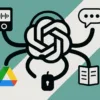In the tech world, ChatGPT stood out as the OpenAI prodigy, winning hearts and minds with its conversational ability. But recent whispers suggest that this AI marvel may be experiencing the digital equivalent of growing pains. Is a teenager sent to ChatGPT and does not want to talk to "stupid" parents. Or, background forces are forcing him to lower his IQ.
Why did ChatGPT go dumb?! Once upon a time, not so long ago, ChatGPT was the talk of the town. His knack for deep, meaningful and sometimes hilariously odd conversations has made him a darling of the tech world. But as with all fast-rising stars, if there is a fall, it can be swift. Recent data paints a picture of declining website traffic and declining app downloads. Once celebrated AI chatter now finds himself in the middle of a PR quandary, as users on social media express their frustrations with his "lazy" answers and increased errors.
In fact, he used to complete simple tasks practically immediately and without hesitation, but now he can't do them or does them only after repeating the commands several times. If he used to be able to follow complex, longer commands, now he can't even follow the basics.
Why is ChatGPT no longer able to answer the most simple questions that it recently mastered completely?
ChatGPT was too much of a change for the existing world. If it worked as it originally did, and even improved, it would mean the extinction of many professions. Millions of jobs worldwide would be at risk. Of course, ChatGPT hasn't become stupid. But it has become limited so that it is not dangerous and this technology cannot be misused, even to create fake news and other copyright violations. Many authors and writers who have used it to help create new content believe that ChatGPT is much worse than the original model.
OpenAI, the proud parent of ChatGPT, was quick to defend its creation. They firmly deny any deliberate "weakening" of their star. Instead, they suggest that the perceived decrease in ChatGPT's performance may be due to its increased use, which exposes its inherent limitations.
We evaluated #ChatGPT's behavior over time and found substantial differences in its responses to the *same questions* between the June version of GPT4 and GPT3.5 and the March versions. The newer versions got worse on some tasks. w/ Lingjiao Chen @matei_zaharia https://t.co/TGeN4T18Fd https://t.co/36mjnejERy pic.twitter.com/FEiqrUVbg6
— James Zou (@james_y_zou) July 19, 2023
The plot thickens with hints about strategic moves of OpenAI. There is speculation that instead of relying on one giant GPT-4 model, OpenAI may be diversifying, creating a series of smaller, specialized GPT-4 models. This 'Mixture of Experts' approach could be game-changing, offering the benefits of a large model without the associated computational costs. Why did ChatGPT go dumb?!
What is the future? OpenAI will develop products specialized in niches and offer them to professional organizations and those willing to pay a lot for exclusive knowledge and development assistance. In a world controlled by forces, it is not wise to make everything available to everyone. That ChatGPT is more limited is proven by various mathematical tests performed by different authors. If something worked before, but now it doesn't, there is something wrong with the model.
While ChatGPT's current trajectory may seem a little shaky, it's worth remembering that every technological marvel, like people, has its ups and downs. Let's hope this is just a temporary blip in ChatGPT's otherwise glittering journey and it will soon be back to grace us with its AI magic.
Stanford & Berkley researchers worried about ChatGPT's declining IQ
In a fresh study still awaiting peer review, scientists from the prestigious Stanford and Berkeley universities revealed that the popular OpenAI language model GPT seems to have lost some of its sharpness. Their findings show that within a few months, the behavior and response accuracy of the GPT-3.5 and GPT-4 models changed noticeably. Of particular concern was the discovery that in March 2023 GPT-4 easily identified prime numbers with an accuracy of 97.6%, but by June 2023 this accuracy had plummeted to a mere 2.4%. These findings are in line with complaints from a number of users who have noticed over the past month that ChatGPT seems to be getting more "dumb". Still, Peter Welinder, OpenAI's vice president of products, was quick to deny that the reduction in model performance was intentional. Instead, he argued that each new version of the model is smarter than the last, and that any changes in the user experience may be due to increased use. However, research from Stanford and Berkeley questions this claim, showing a decline in model accuracy and ability over time. While the researchers did not provide specific reasons for this downward slide, they emphasized that it is important to understand whether updates to a model that are intended to improve certain features actually harm its capabilities in other areas. All of this calls into question OpenAI's claims of constantly improving its models. At the same time, there is a doubt that OpenAI is not doing this on purpose.
Why would OpenAI be limiting ChatGPT?!
- Security Concerns: The stronger the AI, the greater the potential for abuse. Limiting the capabilities of ChatGPT could be a defense mechanism against potential abuses such as disinformation, hacking or other malicious actions.
- Business model protection: OpenAI might want to restrict the free version of ChatGPT to encourage users to purchase paid versions or services that offer more features and capabilities.
- Ethics and responsibility: With increased power comes greater responsibility. OpenAI could restrict ChatGPT to prevent it from inadvertently spreading misinformation or promoting harmful ideas.
- Regulatory pressure: Governments and regulatory bodies around the world are increasingly aware of the power and potential risks of AI. OpenAI could restrict ChatGPT in response to pressure or requests from regulators.
- Maintaining quality: With increased use and load on the system, there could be a decrease in the quality of the answers. Capacity throttling could be a means of ensuring that ChatGPT continues to provide quality and reliable responses. Oziorma that the capacities of access to the service are maintained.
- Technical limitations: Every system has its limitations. Perhaps OpenAI realized that the current infrastructure had reached its limits and decided to limit performance until they could find a solution.
- Intellectual property protection: OpenAI may wish to restrict access to ChatGPT's most advanced features in order to protect its intellectual property and prevent potential copying or abuse by competitors.
But anyway, why ChatGPT has become stupid?!








